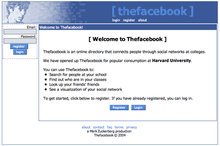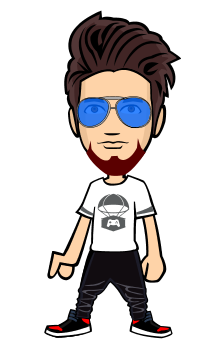Facebook is an online social networking service headquartered in Menlo Park, California. Its website was launched on February 4, 2004, by Mark Zuckerberg with his Harvard College roommates and fellow students Eduardo Saverin, Andrew McCollum, Dustin Moskovitz and Chris Hughes. The founders had initially limited the website's membership to Harvard students, but later expanded it to colleges in the Boston area, the Ivy League, and Stanford University. It gradually added support for students at various other universities and later to high-school students. Since 2006, anyone who is at least 13 years old was allowed to become a registered user of the website, though the age requirement may be higher depending on applicable local laws. Its name comes from a colloquialism for the directory given to it by American universities' students.
After registering to use the site, users can create a user profile, add other users as "friends", exchange messages, post status updates and photos, share videos and receive notifications when others update their profiles. Additionally, users may join common-interest user groups, organized by workplace, school or college, or other characteristics, and categorize their friends into lists such as "People From Work" or "Close Friends". Facebook had over 1.18 billion monthly active users as of August 2015. Because of the large volume of data users submit to the service, Facebook has come under scrutiny for their privacy policies. Facebook, Inc. held its initial public offering in February 2012 and began selling stock to the public three months later, reaching an original peak market capitalization of $104 billion. On July 13, 2015, Facebook became the fastest company in the Standard & Poor’s 500 Index to reach a market cap of $250 billion. Following its Q3 earnings call in 2015, Facebook's market cap soared past $300 billion.
History
2003–2005: Thefacebook, Thiel investment and name change
Zuckerberg wrote a program called Facemash on October 28, 2003, while attending Harvard University as a sophomore (second year student). According to The Harvard Crimson, the site was comparable to Hot or Not and used "photos compiled from the online facebooks of nine houses, placing two next to each other at a time and asking users to choose the 'hotter' person"
To accomplish this, Zuckerberg hacked into protected areas of Harvard's computer network and copied private dormitory ID images. Harvard did not have a student "Facebook" (a directory with photos and basic information) at the time, although individual houses had been issuing their own paper facebooks since the mid-1980s, and Harvard's longtime Freshman Yearbook was colloquially referred to as the "Freshman Facebook". Facemash attracted 450 visitors and 22,000 photo-views in its first four hours online.
The site was quickly forwarded to several campus group list-servers,[clarification needed] but was shut down a few days later by the Harvard administration. Zuckerberg faced expulsion and was charged by the administration with breach of security, violating copyrights, and violating individual privacy. Ultimately, the charges were dropped. Zuckerberg expanded on this initial project that semester by creating a social study tool ahead of an art historyfinal exam. He uploaded 500 Augustan images to a website, each of which was featured with a corresponding comments section. He shared the site with his classmates, and people started sharing notes.
The following semester, Zuckerberg began writing code for a new website in January 2004. He said he was inspired by an editorial about the Facemash incident in The Harvard Crimson. On February 4, 2004, Zuckerberg launched "Thefacebook", originally located at thefacebook.com.
Six days after the site launched, three Harvard seniors—Cameron Winklevoss, Tyler Winklevoss, and Divya Narendra—accused Zuckerberg of intentionally misleading them into believing he would help them build a social network called HarvardConnection.com. They claimed that he was instead using their ideas to build a competing product. The three complained toThe Harvard Crimson and the newspaper began an investigation. They later filed a lawsuit against Zuckerberg, subsequently settling in 2008 for 1.2 million shares (worth $300 million at Facebook's IPO).
Membership was initially restricted to students of Harvard College; within the first month, more than half the undergraduates at Harvard were registered on the service. Eduardo Saverin (business aspects), Dustin Moskovitz (programmer), Andrew McCollum (graphic artist), and Chris Hughes joined Zuckerberg to help promote the website. In March 2004, Facebook expanded to the universities of Columbia, Stanford, and Yale. It later opened to all Ivy League colleges, Boston University, New York University, MIT, and gradually most universities in the United States and Canada.
In mid-2004, entrepreneur Sean Parker — an informal advisor to Zuckerberg — became the company's president. In June 2004, Facebook moved its operations base to Palo Alto, California. It received its first investment later that month from PayPal co-founder Peter Thiel. In 2005, the company dropped "the" from its name after purchasing the domain name facebook.com for US$200,000.
In May 2005, Accel partners invested $12.7 million in Facebook, and Jim Breyeradded $1 million of his own money. A January 2009 Compete.com study ranked Facebook the most used social networking service by worldwide monthly active users. Entertainment Weekly included the site on its end-of-the-decade "best-of" list saying, "How on earth did we stalk our exes, remember our co-workers' birthdays, bug our friends, and play a rousing game of Scrabulous before Facebook?"
A high-school version of the site was launched in September 2005, which Zuckerberg called the next logical step. (At the time, high-school networks required an invitation to join.)Facebook also expanded membership eligibility to employees of several companies, including Apple Inc. and Microsoft.
2006–2011: public access, Microsoft alliance and rapid growth
On September 26, 2006, Facebook was opened to everyone at least 13 years old with a valid email address.
In late 2007, Facebook had 100,000 business pages (pages which allowed companies to promote themselves and attract customers). These started as group pages, but a new concept called company pages was planned. Pages began rolling out for businesses in May 2009. On October 24, 2007, Microsoft announced that it had purchased a 1.6% share of Facebook for $240 million, giving Facebook a total implied value of around $15 billion. Microsoft's purchase included rights to place international advertisements on the social networking site.
In October 2008, Facebook announced that it would set up its international headquarters in Dublin, Ireland. Almost a year later, in September 2009, Facebook said that it had turned cash-flow positive for the first time.
Traffic to Facebook increased steadily after 2009. The company announced 500 million users in July 2010 making it the largest online social network in the world at the time. According to the company's data, half of the site's membership use Facebook daily, for an average of 34 minutes, while 150 million users access the site by mobile. A company representative called the milestone a "quiet revolution."
In November 2010, based on SecondMarket Inc. (an exchange for privately held companies' shares), Facebook's value was $41 billion. The company had slightly surpassed eBay to become the third largest American web company after Google and Amazon.com.

In early 2011, Facebook announced plans to move its headquarters to the former Sun Microsystems campus in Menlo Park, California. In March 2011, it was reported that Facebook was removing approximately 20,000 profiles offline every day for violations such as spam, graphic content, and underage use, as part of its efforts to boost cyber security.
Release of statistics by DoubleClick showed that Facebook reached one trillion page views in the month of June 2011, making it the most visited website tracked by DoubleClick.According to a Nielsen Media Research study, released in December 2011, Facebook had become the second-most accessed website in the U.S. behind Google.
Mark Zuckerberg, 23, founded Facebook while studying psychology at Harvard University. A keen computer programmer, Mr Zuckerberg had already developed a number of social-networking websites for fellow students, including Coursematch, which allowed users to view people taking their degree, and Facemash, where you could rate people's attractiveness.
In February 2004 Mr Zuckerberg launched "The facebook", as it was originally known; the name taken from the sheets of paper distributed to freshmen, profiling students and staff. Within 24 hours, 1,200 Harvard students had signed up, and after one month, over half of the undergraduate population had a profile.
The network was promptly extended to other Boston universities, the Ivy League and eventually all US universities. It became Facebook.com in August 2005 after the address was purchased for $200,000. US high schools could sign up from September 2005, then it began to spread worldwide, reaching UK universities the following month.
As of September 2006, the network was extended beyond educational institutions to anyone with a registered email address. The site remains free to join, and makes a profit through advertising revenue. Yahoo and Google are among companies which have expressed interest in a buy-out, with rumoured figures of around $2bn (£975m) being discussed. Mr Zuckerberg has so far refused to sell.
The site's features have continued to develop during 2007. Users can now give gifts to friends, post free classified advertisements and even develop their own applications - graffiti and Scrabble are particularly popular.
This month the company announced that the number of registered users had reached 30 million, making it the largest social-networking site with an education focus.
Earlier in the year there were rumours that Prince William had registered, but it was later revealed to be a mere impostor. The MP David Miliband, the radio DJ Jo Whiley, the actor Orlando Bloom, the artist Tracey Emin and the founder of Wikipedia, Jimmy Wales, are among confirmed high-profile members.
This month officials banned a flash-mob-style water fight in Hyde Park, organised through Facebook, due to public safety fears. And there was further controversy at Oxford as students became aware that university authorities were checking their Facebook profiles.
The legal case against Facebook dates back to September 2004, when Divya Narendra, and the brothers Cameron and Tyler Winklevoss, who founded the social-networking site ConnectU, accused Mr Zuckerberg of copying their ideas and coding. Mr Zuckerberg had worked as a computer programmer for them when they were all at Harvard before Facebook was created.
The case was dismissed due to a technicality in March 2007 but without a ruling.





